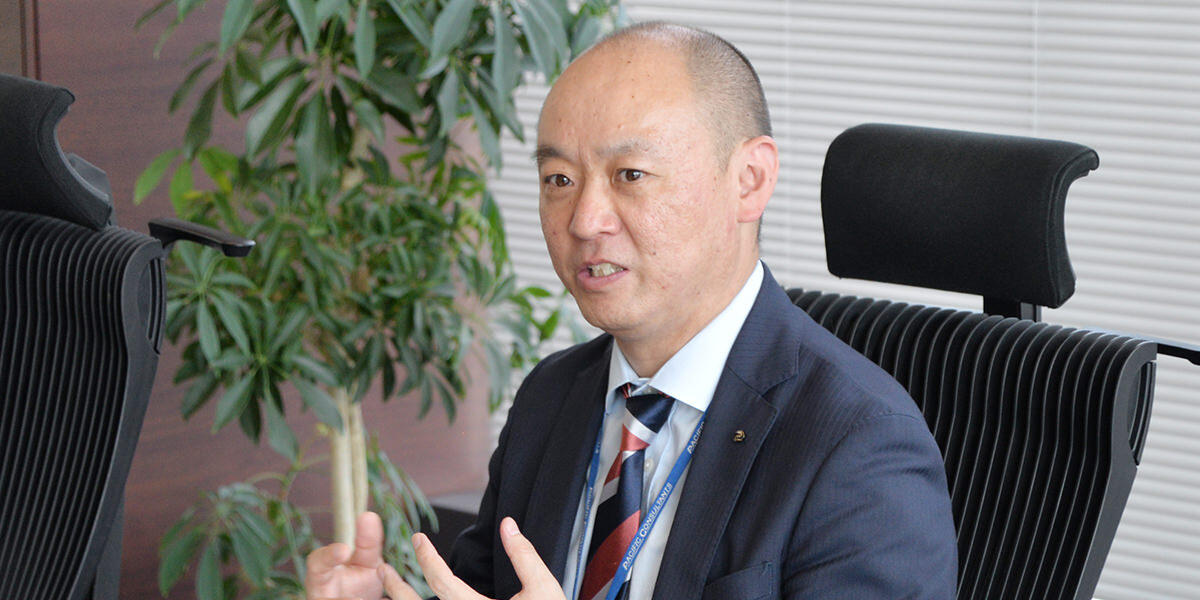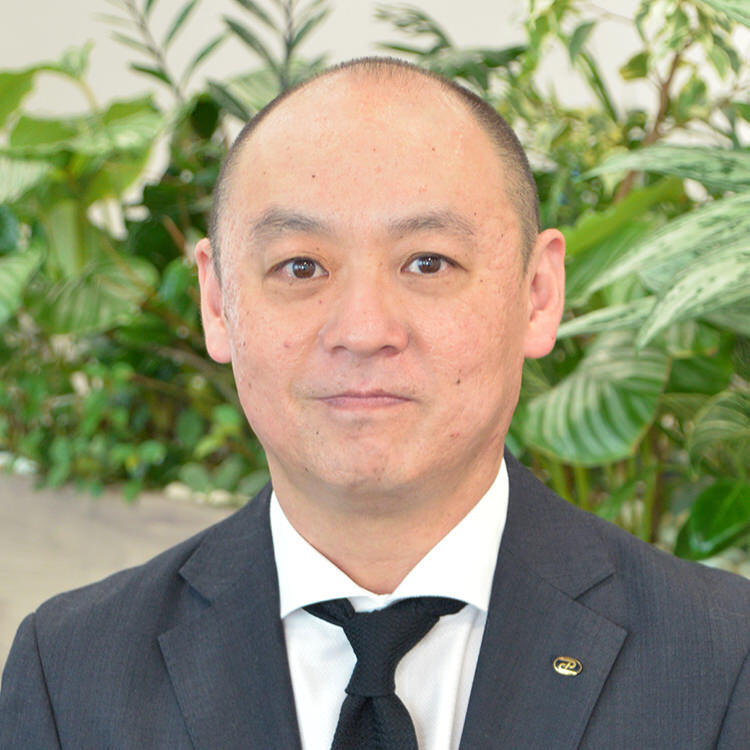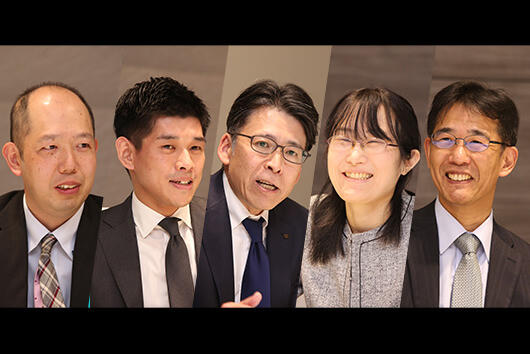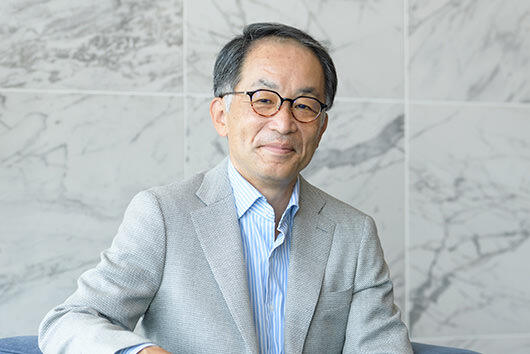Following resolution of the Board of Directors "PACIFIC CONSULTANTS Health Declaration" in July 2023, various measures are being promoted from the perspective that employee's well-being (being in good physical, mental, and social condition) is the foundation of management. Some of the initiatives have already been implemented, while others are in preparation for implementation within this fiscal year, and the initiatives are diverse.
We interviewed Daisuke OYAMA, General Manager of Labor Sec., who is responsible for planning and implementing measures on the KENKO Investment for Health (KIH) Project Team, which was established across Corporate Group, about the company's efforts so far and future plans.
INDEX
- Receiving the 2024 Certified KENKO Investment for Health (KIH) Outstanding Organizations Recognition
- Starting initiatives to realize KENKO Investment for Health (KIH)
- Making steady progress over a long period of time and making it a permanent fixture
Receiving the 2024 Certified KENKO Investment for Health (KIH) Outstanding Organizations Recognition
How did KENKO Investment for Health (KIH) initiatives begin?
A major milestone will be the resolution on KENKO Investment for Health (KIH) at Board of Directors in July 2023. As posted on the website, "PACIFIC CONSULTANTS declares that in realizing our group vision of 'Producing the Future,' we believes that the physical, mental and social well-being of employees is the most important foundation of management, and we will promote KENKO Investment for Health (KIH)." We then announced both inside and outside the company that "We will implement various measures to create a work environment where each employee can work to maintain and improve their health. By ensuring that employees are healthy and motivated, and working with a sense of happiness and security, we will increase productivity and contribute to the realization of our group vision and the sustainable development of society as a whole."
Although we had been working on KENKO Investment for Health (KIH) in the past, in response to this declaration, we launched a new cross-departmental KENKO Investment for Health (KIH) project team to promote KENKO Investment for Health (KIH), and are considering and implementing health measures while sharing information with Health Insurance Society of Architectural Office, industrial physician, public health nurse, and each Area Health Committee. We have been working on obtaining the Certified KENKO Investment for Health (KIH) Outstanding Organizations Recognition since around June, prior to the resolution.

--The 2024 certification was received, right?.
It was our first time to apply, and its deadline was in October, so we only had about four months to prepare, so the preparation was tough, but we were able to get it. We were already working on many of the initiatives required for Certified KENKO Investment for Health (KIH) Outstanding Organizations Recognition. For example, we received the high marks for supporting employees who are injured or ill to return to work, and for interviews with everyone after health checkups. It's also rare for a company to have more than 10 public health nurse as staff. I think it was good that we worked on getting the certification, because it gave us a sense of where we stood compared to other companies.
--How is your employees' health?
As for the Certified KENKO Investment for Health (KIH) Outstanding Organizations Recognition, an evaluation table is available for each individual item. It shows that the management's proactive efforts in disclosing information related to KENKO Investment for Health (KIH) was highly evaluated. Compared to the industry average, this was a high point.
On the other hand, in the area of lifestyle habits, diet, opportunities for exercise, knowledge acquisition about health issues specific to women, and long working hours were rated somewhat low. Looking at the health checkup scoring report provided by the health insurance, there is a problem of lack of exercise, and lipid and blood sugar are also at high risk. I think this is due to eating late and not having many opportunities to exercise.
What causes high blood sugar level?
There is no single decisive factor that causes blood sugar level to rise when you eat a certain food ingredient. I think lifestyle habits such as eating quickly, going to bed late, skipping breakfast, and having lots of snacks and treats are influential. Other factors that may be contributing to this include not eating vegetables at meals, making do with sweet breads, and eating lots of single-item rice bowls.
What bothers me personally is the low rate of people taking specific health guidance. If the results of a health check-up show that a person is at risk of developing a lifestyle-related disease, that person can receive specific health guidance. It doesn't cost anything. However, the rate of people taking this guidance is low.
As the specific health guidance is also increasingly being moved online, starting this fiscal year, we have decided that the time spent on the specific health guidance will be considered as working hours so that employees can receive it during working hours.
Starting initiatives to realize KENKO Investment for Health (KIH)
--Please tell us about the initiatives you have taken so far and those you plan to implement in the future.
As our score for eating habits was low, we are focusing on resolving this issue. In particular, we noticed that the rate of people skipping breakfast was high, so in the previous fiscal year we invited an external registered dietitian to hold a "Breakfast Reform Seminar." We are also now starting a company cafeteria service to help improve eating habits. This is a measure to provide "well-balanced meals," and it involves selling individually wrapped and frozen main dishes, side dishes, soups, and other foods with properly controlled nutritional content for 100 to 200 yen each, which employees can defrost in the microwave before eating. We also serve rice, so you can choose a few and make a set to complete a meal.
--What do you make efforts for exercise habits?
Our company has health committees all over the country, and they have been independently deciding what they want to do and working on it. They plan walking events, softball tournaments, and mountain climbing, and I hope they will continue these. In addition, this term we have applied to the "FUN+WALK PROJECT" implemented by the Japan Sports Agency. There are events that encourage walking, so we would like to work on walking activities. Our company's sport day was also suspended for a while due to the COVID-19 pandemic, but it will re-open in Tokyo. We plan to hold a competition between floors, and we hope to use it as an opportunity for interaction beyond the boundaries of the divisions.
In addition, as an encouragement for the development of exercise habits, we plan to hold health classes on topics such as stretching and muscle training, and to deepen understanding of health issues specific to women by making them compulsory e-learning subjects for all employees.
We also want to emphasize the importance of sleeping in terms of keeping our minds in order. We plan to hold a sleeping seminar with an outside expert to teach people how to get good quality sleeping. We are also planning a menopause seminar. It is becoming more widely known that menopausal symptoms can also occur in menopausal women. We would like to hold this seminar for both men and women this fiscal year.
--Are you considering any measures to combat long working hours?
Although overtime hours are decreasing, the rate of reduction seems to be stagnating, so we would like to share good examples of people who work less overtime and move in the direction of further reduction.
Making steady progress over a long period of time and making it a permanent fixture
--What are your impressions of working on KENKO Investment for Health (KIH) project team?
What I realized again is that our company has a lot of good measures. I came here from outside the company after changing jobs, and I also consulted for other companies as Labor and Social Security Attorney, so I know very well that there are not many companies that have more than 10 public health nurse in the company. There are also only a few companies that interview all employees about the results of their health checkups. I would like to further develop this good aspect.
Even though we don't have a system or a name for KENKO Investment for Health (KIH), our company has always tried to take care of people. We interview all employees after their health checkups, and we have been the first to address any health issues that may have arisen. I think we already have what should be the foundation of KENKO Investment for Health (KIH).
--Please tell us about your aspirations for the future.
On a personal note, when I was invited to take part in this project and asked to be in charge of KENKO Investment for Health (KIH) initiatives, I immediately replied, "Yes, please let me do it."
Originally, I specialize in labor as Labor and Social Security Attorney. Employee's health issues are directly related to labor, and I believe I can contribute to solving management issues by utilizing my experience and knowledge. My own health is a given, but I would like to create a healthy company with all employees by caring about the health of each other's families and employees around us.







